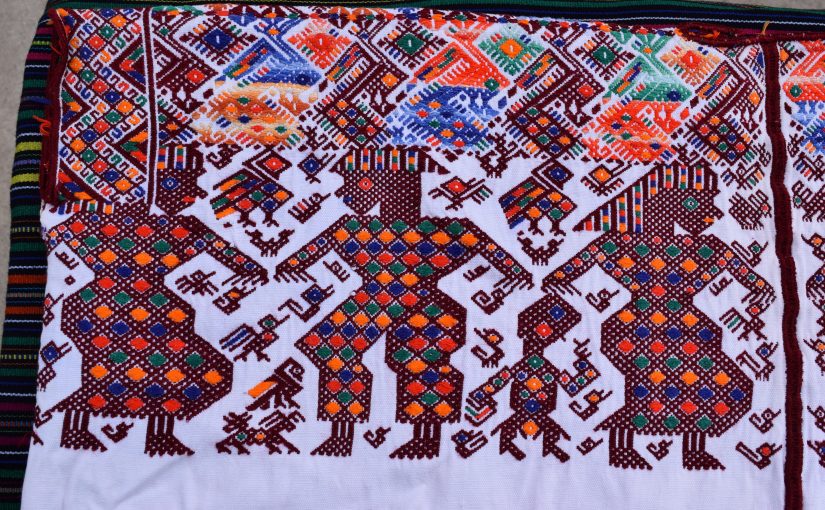This unit is a continuation of unit 28. We will deal with several more constructions that have to do with adjectives.
As a review, Lupita shows us some more examples of adjectives that qualify nouns before we move on to other uses of adjectives:
Adjectives as nouns
K’iche’ adjectives may act as nouns. When referencing humans, they take the regular plural suffix (-Vb’):
alajib’ little ones
ri’jab’ old people
ch’u’jab’ lunatics
meb’a’ib’ poor (pl)
q’inomab’ rich people
q’orib’ lazy ones
Abstract nouns from adjectives
When adjectival roots add the suffix –Vl, they reference the quality expressed by the adjective or a relationship of inherent possession (the vowel of the suffix is not predictable and has to be learned).
Intensification
There are two ways of intensifying modifiers: the adverbial sib’alaj or the suffixal -alaj:
Sib’alaj
Sib’alaj is an adverb that can modify the predicate or verb of a phrase:
-alaj
The suffix –alaj intensifies adjectives and appears in attributive position only. There is no attributive –a linking attribute and noun.
Adjectival quality gradations
Adjectives in K’iche’ can be graded according to degree of its property. The suffix -C1-oj indicates a somewhat lesser degree of the quality expressed in the adjective.
Comparative phrases
Comparative phrases require the pronoun are in phrase-initial position at the beginning and the relational noun ch(i)–E-wach. Examples below use the third person sg. (ch-u-wach) because objects or people other than speaker and addressee are being compared.
Are nim le atz’i’ chuwach le nutz’i’.
Your dog the big in comparision with my dog
Your dog is bigger than mine.
Are sib’alaj kaq le apo’t chuwach le nupo’t
Your huipil is red in comparision with my huipil
Your huipil is redder/has more red in it than mine
Sib’alaj aninaq kach’aw le are’ chinuwach in
He speaks very fast in comparision with me
He speaks a lot faster than I.
For negation: “he is not Xer than….” the adjective or verb is negated with the usual na…ta(j) negation frame.
Your dog is not bigger than mine.
He doesn’t talk faster than me.
Superlatives
To express the outstanding quality of an object, comparative phrases or the adverb sib’alaj with raised pitch and elongated pronunciation are used.
Versive derivation
An intransitive verb is derived from adjectives/nouns meaning to turn/become X or to acquire the quality of X . This derived verb is called a “versive” and is formed using the suffix –Vrik to the adjectival stem. The exact form of the vowel of the suffix has to be memorized. The suffix –ik is a phrase final marker, which is dropped when the verb is not in phrase-final-position. Be aware that not every noun/adjective has a versive derivation. Versives derived from positional stems take the suffix –Vb’ik.
Versive from adjectival roots (-a/ir(ik))
Versives from positional roots (-ob’ik)
“Joron” is an irregular versive:
| Al | heavy |
| Alaj | little (young, used for animals, children) |
| B’aq | thin (bony) |
| Ch’am | sour |
| Tz’il | dirty |
| Ch’aqal(ik) | wet (this is a positional adjective that loses suffixal -ik when not in phrase final position) |
| Ch’u’j | crazy |
| Ch’uti’n/ch’utiq(pl) | small |
| Chaqi’j | dry |
| Chom | fat |
| Itzel | evil |
| Je’l | beautiful |
| Joron | cold (food, drink, water) |
| K’a | bitter |
| K’a’n | mean |
| K’ak’ | new |
| K’aslik | alive, awake |
| K’ax | difficult, pain |
| K’ok’ | delicious |
| Kamnaq | dead |
| Kaq | red |
| Ki’ | sweet |
| Ko | strong, hard |
| Miq’in | hot |
| Ne’ | baby |
| Nich’/nich’aq | tiny, small |
| Nitz’/Nitz’aq | small, tiny |
| Nim/Nimaq | big |
| Ojer | ancient, back in the day |
| Pim | thick |
| Q’an | yellow |
| Q’eq | black |
| Rax | green, blue |
| Rikil | food (in the sense of dish or particular kind of food) |
| Sak’aj | industrious, ambitious, smart |
| Sak’aj E-jolom | to be smart, intelligent, early riser |
| Saq | white |
| Tew | cold (climate) |
| Ti’oj | muscular |
| Tz’ikin | bird |
| Tza | salty |
| Utz | good |
Translate the following sentences into English:
- Tz’iltz’oj le upowi’ le numam.
- Nim le ukami’x le ak’al.
- Kab’in le q’eq’akej pa le b’e.
- K’a’n le uch’utinan le walib’.
- Sib’alaj je’l le k’aslemal we kaloq’oj awib’.
- Ketyo’n le nimaq taq tz’i’.
- Xukoj le nuk’ak’a po’t le al Talin.
- Sib’alaj k’ok’ le uwa’l ik.
- Ch’am le q’or.
Answers
- My grandfather’s hat is a little dirty.
- The boy’s shirt is big.
- The black horse walks on the street.
- My sister-in-law’s aunt is mean.
- Life is very beautiful if you love yourself.
- The big dogs bark.
- Talin wore my new huipil.
- The broth is very tasty.
- The atol went bad (it is sour).
Translate the following sentences into K’iche’:
- The very good teacher died.
- The poor (ones) have no food.
- The book is thick.
- The little cats are in the milpa.
- Wel ate a delicious peach.
- Tomás has a black cat.
- María’s clothes are dry.
- Diego’s car is very small.
Answers
- Xkam le utzalaj ajtij.
- Maj le kiwa le meb’a’ib’.
- Pim le wuj.
- Le nich’aq taq me’s e k’o pa le ab’ix.
- Xutij le k’ok’alaj tara’s le aWel.
- K’o jun uq’eqa me’s aMax.
- Chaqi’j le ratz’yaq le alMari’y.
- Nitz’ le uch’ich’ le aTe’k.
